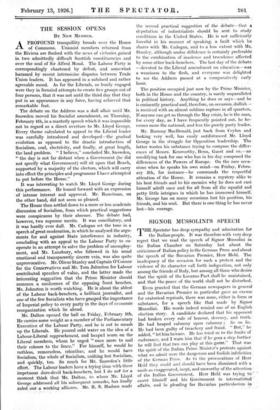THE SESSION OPENS
BY NEW MEMBER.
APROFOUND tranquillity broods over the House of Commons. Unionist members returned from the Riviera are flushed with the news of victories gained in two admittedly difficult Sottish constituencies and over the soul of Sir Alfred Mond. The Labour Party is correspondingly , chastened by defeat, and somewhat harassed by recent internecine disputes between Trade Union leaders. It has appeared in a subdued and rather agreeable mood. As for the Liberals, so busily engaged were they in frenzied attempts to create five groups out of four persons, that it was not until the third day that they put in an appearance in any force, having achieved that remarkable feat.
The debate on the Address was a dull affair until Mr. Snowden moved his Socialist amendment, on Thursday, February 4th, in a masterly speech which it was impossible not to regard as a direct overture to Mr. Lloyd George. Every theme calculated to appeal to the Liberal leader was carefully introduced and developed—the gradual evolution as opposed to the drastic introduction of Socialism, coal, electricity, and finally, at great length, the land problem. "I believe," concluded Mr. Snowden, "the day is not far distant when a Government (he did not specify what Government) will sit upon that Bench, supported by a majority of the electors, which will carry into effect the principles and programme I have attempted to put before the House."
It was interesting to watch Mr. Lloyd George during --this performance. He leaned forward with an expression of intense interest and approval. Mr. Runciman, on the other hand, did not seem so pleased.
The House then settled down to a more or less academic discussion of Socialism, from which practical suggestions were conspicuous by their absence. The debate had, however, two supreme merits. It was conciliatory, and it was hardly ever dull. Mr. Cadogan set the tone in a speech of great moderation, in which he analysed the argu- ments for and against State interference in industry, concluding with an appeal to the Labour Party to co- operate in an attempt to solve the problem of unemploy- ment, and Mr. Lansbury, who followed in his usual emotional and transparently sincere vein, was also quite unprovocative. Mr. Oliver Stanley and Captain O'Connor for the Conservatives and Mr. Tom Johnston for Labour contributed speeches of value, and the latter made the interesting suggestion that the Prime Minister should summon a conference of the opposing front benches. Mr. Johnston is worth watching. He is about the ablest of the Labour back-benchers, a brilliant journalist, and one of the few Socialists who have grasped the importance of Imperial policy to every party in the days of economic reorganization which lie ahead.
Mr. Dalton opened the ball on Friday, February 5th. He carries some weight as a member of the Parliamentary Executive of the Labour Party, and he is out to smash up the Liberals. He poured cold water on the idea of a Labour-Liberal rapprochement, and heaped scorn on the Liberal members, whom he urged "once more to nail their colours to the fence." For himself, he would be ruthless, remorseless, relentless, and he would have Socialism,' the whole of Socialism, nothing but Socialism, and quickly, too. So much for Mr. Snowden's little effort. The Labour leaders have a trying time with these impetuous dare-devil "back-benchers, but I do nof for a moment think that 'Mr. Dalton, to whom- Mr. Lloyd George addressed all his subsequent remarks, has finally ruled out a working alliance. Mr. R. S. Hudson made - _ the second practical suggestion of the debate—that a deputation of industrialists should be sent to study conditions in the United States. He is not sufficiently forceful in his manner of speaking, a fault which he shares with Mr. Cadogan, and to a less extent with Mr. Stanley, although undue diffidence is certainly preferable to the combination of insolence and truculence affected by some other back-benchers. The last day of the debate, —devoted to the Liberal amendment on education—was a weariness to the flesh, and everyone was delighted to see the Address passed at a comparatively early hour.
The position occupied just now by the Prime Minister, . both in the House and the country, is surely unparalleled in political history. Anything he does or says—and lie is eminently practical and, therefore, on occasion, dullish— is received with an almost sublime rapture in all quarters. If anyone can get us through the May crisis, he is the man, for every day, as I have frequently pointed out, he be- comes more the national, and less the purely party leader.
Mr. Ramsay MacDonald, just back from Ceylon and looking very well, has easily outdistanced Mr. Lloyd George in the struggle for Opposition leadership. The latter wastes his substance trying to compose the differ- ences of Messrs. Kenworthy, Benn, Guest and co.—an unedifying task for one who has in his day composed the differences of the Powers of Europe. On the rare occa- sions when he speaks his own mind—on Friday, Febru- ary 5th, for instance—he commands the respectful attention of the House. It remains a mystery alike to his best friends and to his enemies why he does not cast himself adrift once and for all from all the squalid and petty little intrigues in which he has immersed himself. Mr. George has on many occasions lost his position, his friends, and his soul. But there is one thing he has never lost—his courage.


















































 Previous page
Previous page